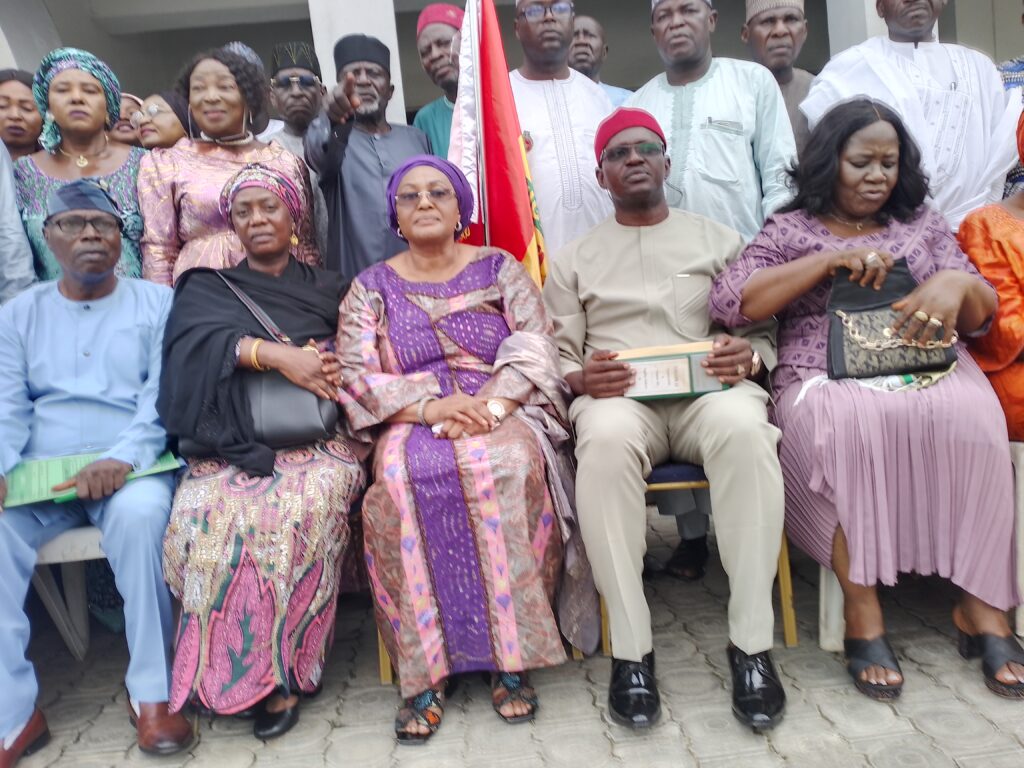By Abdul Lauya
In a historic leadership transition at the Legion Headquarters in Abuja today, Ms. Grace Morenike Henry was formally installed as the new National Chairman of the Nigerian Legion, becoming the first female to lead the largest veterans’ organization in Africa.
The handing and taking over ceremony was conducted between the outgoing Chairman, Major General AbdulMalik Jibrin (rtd), who was represented by the National Secretary General, Vincent Abiola, and the incoming Chairman. The event was witnessed by high-ranking retired military personnel, senior Ministry of Defense officials, and representatives of widows and female veterans.
In his valedictory remarks, Gen. Jibrin commended Ms. Henry’s appointment, urging her to “remain focused” and pledged his continued support. He called on all state and local government chapters of the Legion to give her “maximum cooperation” to enable her succeed in her new role.
In a moment of deep significance for gender representation in military-related institutions, Ms. Henry expressed gratitude to President Bola Ahmed Tinubu for entrusting her with the appointment.
She also acknowledged the Honourable Minister of Defence, Mohammed Badaru, Minister of State for Defence, Bello Mohammed Matawalle, and the Service Chiefs for their unwavering support.
“I pledge not to disappoint Mr. President and all who have placed this confidence in me,” she said, while laying out a comprehensive vision focused on inclusivity, welfare, and international positioning of the Nigerian Legion.
Ms. Henry committed to consolidating the achievements of her predecessor, prioritizing the welfare of the most vulnerable in the veteran community, including widows, orphans, and the aged; as well as the actualization of the long awaited Ministry of Veterans Affairs.
In a bold declaration, she vowed to “fight and reclaim what belongs to the veterans,” indicating a readiness to challenge institutional inertia and red tape that often delay entitlements for retired personnel.
Perhaps the most ambitious element of her address was her stated goal to elevate the Nigerian Legion onto the international stage. She pledged to “align the Legion’s operations with global best practices in veteran affairs and administration,” signaling a future of cross-border partnerships, enhanced transparency, and capacity development.
The ceremony was also attended by notable military retirees including Rear Admiral Jummai Malafa (rtd), Air Commodore Femi Oguntuyi, who led the 5-man ministerial committee on veteran welfare, Commodore Kabir Aliyu, Air Commodore Sani Zakari and Col Funmilayo.
The presence of these Distinguished personalities, alongside state Legion Chairmen and female veterans, underscored a unified front behind the new leadership.
Ms. Henry’s appointment marks a watershed moment for gender inclusion in Nigeria’s military-affiliated institutions. It represents not only recognition of competence but also a broader institutional shift toward inclusive governance in the post-service lives of military personnel.
As a woman leading a male-dominated organization, her success could catalyze a new era where military service and post-service leadership are no longer gender-exclusive.
Her plans to champion the cause of widows and orphans, often sidelined in post-conflict policy discussions, offer renewed hope for a more compassionate and people-centered administration. If her international ambitions materialize, the Nigerian Legion may emerge as a model institution for post-service care across the continent.
In the coming months, all eyes will be on Ms. Henry to see how she balances reform, advocacy, and institutional diplomacy, tasks that will define her legacy and possibly, set a global precedent for veteran leadership in Africa.
For advert placement and inquiries, publication of press releases, and news coverages, please call: Phone: 08052898434 Email: editor@eyereporters.com, click here to view the advert rates.



